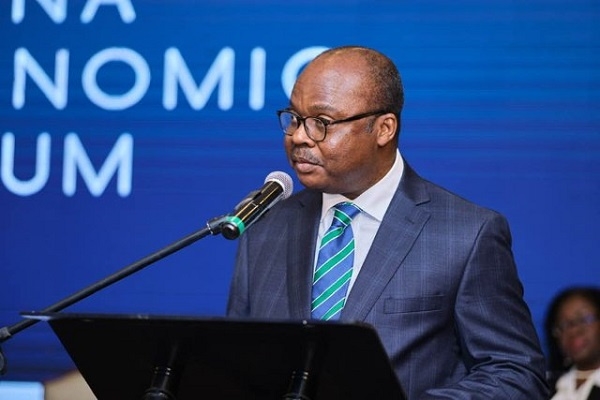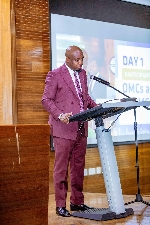MoMo accounts up from 14.4m to 19m – BoG Governor
 BoG Governor Ernest Addison
BoG Governor Ernest Addison
As a result of the COVID-19 pandemic, customers of digital payment channels actively used their accounts, while dormant accounts were activated and new customers were on-boarded.
“This shows that the pandemic injected some vigour into the digital payments space and pulled households and firms into the financial technology space”, Governor of the Bank of Ghana, Dr Ernest Addison said at the 21st Annual Bankers Week Dinner of the Chartered Institute of Bankers on Saturday, 11 December 2021.
He said currently, “there are more than nineteen million (19,000,000) active mobile money accounts driving the digital financial services industry. Prior to the pandemic, this number was 14.4 million”.
Similarly, he noted that “mobile money interoperability continued to show strong growth of about 365 per cent in transaction volumes and 651 per cent in transaction values between 2019 and 2020”.
“These trends point to increased consumer confidence and preference for digital payment options in the economy”, he observed, adding: “Collectively, therefore, we, as stakeholders, must leverage these positive headwinds to develop and implement digital strategies to spur growth in the digital financial services sector”.
Read Dr Ernest Addison’s full statement below:
KEYNOTE ADDRESS BY DR. ERNEST ADDISON GOVERNOR, BANK OF GHANA
December 11, 2021
President of the Chartered Institute of Bankers (CIB),
Members of the Governing Council of CIB,
Chief Executive Officers of Banks,
Associates and Fellows of CIB,
Distinguished Guests,
Ladies and Gentlemen,
1. Good evening. All too soon 2021 is coming to an end; it has been a very eventful year with all the challenges and opportunities. It is a pleasure to join the banking fraternity at this annual Dinner event to praise God Almighty for His blessings during the year and allowing us to meet once again in a healthy and favourable condition.
2. Let me thank the CIB President and her team for yet another successful Bankers’ week celebrations. The theme for this year’s celebrations, “The Digital Economy of Ghana – The Strategic Role of the Banking Industry,” was apt. The banking sector mostly is the main sector in which technological innovations have had the most profound effects. Digital innovation and transformation has been made more significant during the pandemic. To allow the economy to benefit fully, we need to ensure that tech innovations are made under secure, reliable. And ensure that robust infrastructures are in place to facilitate transformation in the economy.
3. As has been our tradition, allow me to first provide an update on our assessment of the economy and the banking sector and our recent decisions.
4. The steady economic recovery from the pandemic effects since the last quarter of 2020 continued into 2021. The Bank’s measure of economic activity (the Composite Index of Economic Activity) recorded an annual growth of 11.2 percent in September, compared with 10.8 percent and 4.2 percent in the same periods of 2020 and 2019, respectively. For instance, we have seen strong growth and rebound in domestic VAT collections, industrial consumption of electricity, port activity, imports, and air-passenger arrivals.. This sustained rebound in economic activity is underpinned by turnaround in both consumer and business sentiments, driven by perceived improvements in economic prospects, although consumers expressed some concerns about current household finances.
5. On the external front, Ghana’s external position has continued to remain strong, despite a narrowing of the trade surplus as economy recovers and imports increase. Production of key export commodities, Cocoa and Gold, remained firm although Oil output fell behind projections. At the same time, higher services outflows continued, resulting in a widening of the current account deficit to US$1.9 billion, compared with US$1.2 billion in 2020. The above notwithstanding, the still supportive policy environment and the effective manner in which the government managed the Corona Virus allowed confidence to remain strong in the Ghanaian economy, resulting in higher inflows from foreign direct investments, portfolio flows, in addition to the IMF SDR allocation. All these put together led to a balance of payments surplus of US$1.7 billion, higher than the US$334 million surplus recorded a year ago.
6. Ladies and Gentlemen, these developments supported the build-up of international reserves to US$10.8 billion (equivalent to 4.9 months of import cover) in October 2021 from US$8.6 billion 4 (representing 4.0 months of import cover) at the end of December 2020, and provided enough cushion in the foreign exchange market as demand pressures from corporates, importers, and offshore investors increased since October 2021. Cumulatively, the Ghana Cedi recorded a year-to-date depreciation of 2.7 percent against the US dollar in November 2021, compared with 3.9 percent depreciation in the same period of 2020.
7. Ladies and Gentlemen, during the year, inflation steadily eased to as low as 7.5 percent in May 2021, from 11.4 percent at the peak of the pandemic in July 2020. More recently however, as is the case globally, inflation has trended up to 11.0 percent in October 2021, outside the medium-term target band of the Central Bank, due to both supply (food prices) and demand (petroleum price pressures) shocks. Underlying inflation pressures are also elevated, highlighting the risks to the inflation outlook.
8. Ladies and Gentlemen, the above developments informed the MPC’s assessment of the emerging risks and threats to inflation, particularly as these supply side constraints become embedded in 5 general price setting behaviour. To prevent the potential risk of deanchoring inflation expectations in the outlook, and undermining the price stability objective of the central bank which has underpinned and supported the broad-based recovery we have experienced so far, the MPC raised the Monetary Policy Rate by 100 basis points.
9. The economic outlook for 2022 is positive although there are some potential risks which should be closely monitored. In particular, the uncertainties surrounding food prices, petroleum price adjustments, inflationary pressures in the outlook.
10. and the potential second round effects of these are likely to exert The recent widening of the Ghana’s sovereign bond spreads after a successful bond issue in April 2021 surprised all of us, although we were aware of investor sentiments and their assessment of Ghana’s fiscal risks as they see the fiscal deficit outturn for 2020 as unsustainable and expecting very bold and decisive measures from the government to re-anchor fiscal consolidation and stabilise debt. Investors have assessed that, as compared to our peers, Ghana required a stronger fiscal rectitude 6 to re-establish investor confidence, and did not see the mid-year budget as addressing their sentiments. The markets assessment of the 2022 budget also suggest lingering doubts about the ability of the revenue measures announced to translate into a large increase in domestic revenue. To add to this, government expenditure is projected to increase significantly in 2022.
11. Ladies and Gentlemen, the widening spread triggered investor sell-offs and has created a huge financing gap and put pressure on the local currency. As a Market Access Country, we have a huge burden to demonstrate a strong recovery and to ensure that the bold revenue measures introduced yield the required results. We are at a point where there is no room for policy forbearance on all levels, otherwise the huge financing burden could unravel the anchor and erode the gains we have made in the last 4 years. This calls for a social contract on fronts with common aspirations across the aisle to make sure we sustained the recovery momentum.
12. Ladies and Gentlemen, this is a good place to move the discussion to the banking sector. The sector has been significantly 7 transformed following recapitalization and comprehensive regulatory reforms. As if by some divine design, the reforms repositioned banks with strong capital buffers before the 2020 COVID-19 pandemic hit. After the shock, the Bank granted macroprudential regulatory reliefs to ease liquidity constraints within the financial sector. To a large extent, these supportive policies, together with stringent supervision and regulation, ensured that the banking sector remained sound and well-capitalised with strong growth in total assets, investments and deposits, despite the challenging pandemic environment.
13. The size of the balance sheet of the banking system continues to expand. In the first ten months of the year, total assets increased by 16.1 percent year-on-year to GH¢173.8 billion. Total deposits grew by 17.2 percent on an annual basis to GH¢117.4 billion, supported by strong liquidity flows, while the gradual improvement in gross advances has continued, with 8.9 percent growth at end October 2021 compared with 5.2 percent at end-June. The industry’s Capital Adequacy Ratio of 19.8 percent as at end-October 2021 was well above the current regulatory minimum threshold of 8 11.5 percent. Profitability in the industry was strong, with a 21.8 percent annual growth in profit before tax to GH¢6.0 billion at the end of October 2021.
14. Ladies and Gentlemen, the macroprudential policy measures and regulatory reliefs implemented at the onset of the pandemic remain in place to support a more robust recovery of the economy. However, the expected boost to private sector credit growth has been sluggish, amid relatively sticky lending rates in the banking sector. The recently published Annual Percentage Rates (APRs), which reveal actual lending rates in the banking sector, indicate that average base rate charged small and medium enterprises on a 1year loan ranged between 19.5 percent and 30.4 percent at the end of September 2021. On all counts, these rates are very high and have proven inimical to private sector credit expansion that was expected from the regulatory reliefs, even considering the lingering uncertainties surrounding the pandemic. Annual growth in private sector credit was 10.1 per cent in October 2021 compared with 13.4 percent in October 2020. In real terms, private sector credit contracted by 0.8 percent compared with 3.0 percent growth over 9 the same comparative periods. As regulators, we expect that as the growth momentum gains traction, supported by COVID-19 vaccination efforts, private sector credit will rebound.
15. Broadly, the banking sector outlook remains positive. Results from the November 2021 stress tests show a banking sector that remains resilient to mild and moderate credit risk and liquidity stress conditions. The potential effects of a prolonged pandemic on the banking sector, particularly on asset quality, however, needs to be monitored carefully to inform policy measures. The Committee decided that macroprudential policy measures and regulatory reliefs announced at the onset of the pandemic should remain in place to support a more robust recovery of the economy. Now, Ladies and Gentlemen, to the topic of the day, that is, the strategic role of banks in the Ghana’s emerging digital economy…
16. Globally, a new economy is emerging, built on digital technology. From agriculture, through industry, to commerce, to name just a few, no sector has been spared the transformational 10 power of technology. Advanced communication technologies have linked businesses and consumers across national boundaries, breaking down the physical barriers to human interactions. This new wave of change has been described in some circles as the fourth industrial revolution, characterised by the diffusion of knowledge and transfer of technology.
17. In Ghana, the trends are not different. The high mobile phone penetration rate, that is the ratio of mobile subscribers to total population, has improved nationwide connectivity and resolved the challenges of distance and unfriendly terrain. The availability of internet, and the flexibility and customer convenience has facilitated a vibrant online local community, which has supported electronic transactions and prompted a major shift towards e-commerce. Currently, businesses in various sectors of the economy - including restaurants, supermarkets, pharmacies, airlines and hotels – are doing a lot of online transactions. Also, the predominantly youthful population with strong affinity towards and dexterity with digital devices is providing an added push towards Ghana’s digitisation agenda.
18. Distinguished Ladies and Gentlemen, the COVID-19 pandemic was challenging, but it also presented some opportunities. As you will recall, following the restrictive measures imposed to contain the spread of the virus, the Bank, in collaboration with industry stakeholders, embarked on measures that encouraged the use of electronic payments. So far, the data suggests that use of the various electronic payment channels of banks and payment service providers recorded phenomenal increase within that period.
19. Customers of digital payment channels actively used their accounts, while dormant accounts were activated and new customers were on-boarded. This shows that the pandemic injected some vigour into the digital payments space and pulled households and firms into the financial technology space. Currently, there are more than nineteen million (19,000,000) active mobile money accounts driving the digital financial services industry. Prior to the pandemic, this number was 14.4 million. Similarly, mobile money interoperability continued to show strong growth of about 365 percent in transaction volumes and 651 percent 12 in transaction values between 2019 and 2020. These trends point to increased consumer confidence and preference for digital payment options in the economy. Collectively, therefore, we, as stakeholders, must leverage on these positive headwinds to develop and implement digital strategies to spur growth in the digital financial services sector.
20. Ladies and Gentlemen, a key feature of a digital economy is the aggregation of digital platforms that facilitate economic and social activities. Mostly these platforms require integration with the financial services sector to achieve the convenience, speed and efficiency desired by users. Here, I must commend banks, specialised deposit-taking intuitions, and FinTech partners for the innovative solutions currently driving the emerging digital financial service industry in the country. The various financial services accessible through social media platforms, including Whatsapp, clearly demonstrate your swiftness to adapt to the dynamic technological changes. 13
21. I dare say, however, that we have barely scratched the surface of financial services digitisation because most people still do not have access to such services. Cash transactions still dominate the retail payments space despite the availability of various digital financial products and services. The increasing use of smartphones is leading to complex digital financial products and services with the likelihood of exclusion for ordinary persons. And, the challenge is how to carry along every eligible person and business into the fold of financial digitization without stagnating innovation.
22. Over the past twenty (20) odd years, the Bank of Ghana has provided leadership in the digitalization of the Ghanaian financial services industry. Starting from 1998 to date, three (3) sequential strategy documents have directed the development of digital financial services, with the extant one being the third and scheduled to run its full course by the end of 2024. Besides the solid interbank payment system infrastructure, the regulatory environment has also evolved and provided a strong legal foundation for dynamism in the payment ecosystem with customer needs at the focal point.
23. Starting with the Payment System Act, 2003 (Act 662), the legal basis was established for digitalization of interbank payments with implementation of the real time gross settlement system (RTGS). The RTGS platform improved interbank liquidity management, and significantly reduced credit and settlement risks. These achievements set the stage for the development of a dependable digital financial services based on the timely execution of funds transfers and the certainty of funds arising from the twin attributes of irrevocability and settlement finality.
24. Act 662 also made possible a variety of interbank retail electronic payment systems, such as electronic cheque clearing, direct debit and credit transfer under the automated clearing house platform, and instant payment system, thereby diffusing the benefits of digitalisation to bank customers. Similarly, the 2008 Branchless Banking Guideline and the 2015 Electronic Money Issuer and Agent Guidelines issued pursuant to Act 662 further expanded digital financial services to the unbanked and underserved in the form of mobile money and sped up the financial inclusion drive 15 beyond bank branches, rural and community banks, and other ‘brick and mortar’ outlets of financial institutions.
25. To boost merchant wallet transactions, the Bank issued a three (3)-tier KYC merchant account framework to cater for the digital merchant account on-boarding needs of businesses of different sizes and financial strength. Similarly, the Ghana Interbank Payment and Settlement Systems (GhIPSS), working with industry stakeholders, deployed a universal QR code, called the GhQR code, to promote affordable acquisition of merchants for acceptance of digital payments. A consumer-centric interchange fee is being developed by GhIPSS in conjunction with banks, mobile money operators, and payment service providers that will incentivise service providers and allow mobile money account holders to make fee-free interoperable payments at merchant points of sale.
26. About five years ago, Bank of Ghana observed the transition of technology companies from giving passive back office support to banks and specialised deposit taking institutions to taking active roles in financial service delivery. The collaboration of banks with 16 financial technology companies has resulted in the deployment of innovative digital financial products, expanded access to financial services, and furthering of Bank of Ghana’s cash-lite and financial inclusion programme.
27. The universal banks and FinTechs collaborative business models were deemed the perfect fit to enhance financial deepening and to support the process of a digital Ghanaian economy. Therefore, the Bank worked with stakeholders to strengthen the regulatory regime with the enactment of the Payment Systems and Services Act, 2019 (Act 987) to create a conducive regulatory environment for digital financial services. Act 987 has subsequently fostered a strong strategic alliance among banks and FinTechs in the delivery of digital financial products and services for different segments of the market.
28. Other supportive pieces of legislation relevant to the digital economy have been enacted and include the Electronic Transactions Act, 2008 (Act 772), Data Protection Act, 2012 (Act 843), Cyber Security Act, 2020 Act 1038) and Anti-Money Laundering Act, 2020 17 (Act 1044), all intended to build consumer confidence in the national digital transformation agenda. With the successful rollout of the national biometric identification card, implementation of the flagship Ghana.Gov payment platform and the establishment of the National Cyber Security Authority, a robust foundation has been laid for a responsible, trustworthy and sustainable digital economy. 29. Ladies and Gentlemen, as online business transactions have grown, so has the incidence of cyber-attacks, and mobile money and ATM fraud. To forestall such activities from becoming embedded and weakening the digitisation drive, the Bank has established a Financial Industry Command Security Operations Centre (FICSOC). Among others, FICSOC seeks to provide broader perspectives on cyber threats confronting the sector through constant monitoring and intelligence sharing. The Bank has also adopted an integrated Risk-based Supervisory Approach for digital financial services to focus on functional areas of operation and systemic risks. This includes a holistic review process involving prudential, market conduct, financial integrity, and payment systems risk perspectives for products, services, and technology 18 outsourcing arrangements proposed by banks and non-banks or FinTechs. These tighter regulatory frameworks will ensure the integrity of the digital financial services ecosystem, improve consumer confidence, strengthen the widening acceptance of digital financial services, and scale up financial inclusion.
30. The financial technology industry is rapidly expanding and banks will have to innovate to keep abreast and remain relevant in the digital space. To support banks in this endeavour, the Bank of economy. Ghana has established a regulatory and innovation sandbox to livetest digital financial service innovations in a controlled environment before approval and implementation. I urge all banks to take advantage of this opportunity or to establish similar innovation centres to support and sustain the drive towards the digital.
31. Ladies and Gentlemen, there is no doubt that the private sector has spearheaded the recent surge in innovative financial digital solutions, supported by the enabling environment provided by Bank of Ghana. However, there is a limit to which private sector 19 resources can be used to address the constraints to financial inclusion. For the digital economy to be truly inclusive, every eligible person must have access to some form of digital payment instrument, just like the physical currency. It, therefore, behoves the Bank to guarantee universal access to digital payment instruments, and one sure way to do that is through the issuance of Central Bank Digital Currency (CBDC). The Bank has already taken the first steps to pilot the CBDC concept. When finalised, this single project is expected to usher Ghana into a digital economy. So far, the pilot implementation.
32. CBDC project, which commenced in September 2021 in partnership with G+D, is progressing steadily and, as major stakeholders, all banks will be engaged in the process. We are confident that you will lend your full support to this project for a successful In closing, Ladies and Gentlemen, let me reiterate that efficient, convenient, and safe digital financial services are central to the digital economy and for ensuring a financially inclusive society. A sustainable digital banking environment should be peoplecentred, therefore banks’ resources and efforts should be guided by 20 inclusive strategies that promote the integrity of the payments ecosystem to build confidence in users. These initiatives, in addition to lessons provided by COVID-19 pandemic, should provide the needed stimulus for developing a robust, resilient and inclusive digital financial service industry supportive of a digitised Ghanaian economy.
33. On this note, Distinguished Ladies and Gentlemen, let me wish you compliments of the season and a Happy and Prosperous New Year in advance.
Thank You for your attention.
Source: classfmonline.com
Trending Business

NPA CEO says $200m needed to fully revamp TOR and expand capacity
12:35
TOR resumes crude oil refining after years of inactivity
10:32
Gov't to revive Juapong Textiles through PPP-Ablakwa reveals
10:12
TAGG raises alarm over GRA–TRUEDARE digital customs deal
14:15
Government, Afreximbank resolve issues over US$750m facility
10:17
Muntaka Entrepreneurship Hub trains over 100 women in Asawase
14:16
Ghana Gold Board rakes in over $10bn ahead of target
09:56
GEXIM faces GHS1.5bn credit exposure as NPLs near 30% — CEO
09:36
Six Degrees delivers immersive experiential production at Kweku Smoke’s revival concert
10:37
GIPC highlights govt’s commitment to retail sector transformation at GUTA conference
03:01



